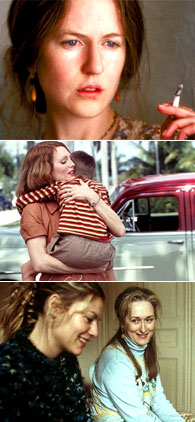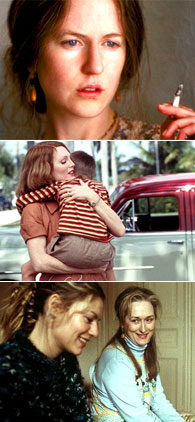Mix a powerhouse production team with impressive pedigree, heavy-weight actresses with Oscar-laden resumes and a script with more lesbian overtones than a k d lang concert, and you'll get a movie especially created for Oscar domination.

From the top: Nicole Kidman as Virginia Woolf, Julianne Moore as Laura Brown and Claire Danes as Julia and Meryl Streep as Clarissa.
One of the women is British famous novelist, Virginia Woolf, whose drowning in 1941 is enacted in The Hours' opening scene. Woolf is played by Nicole Kidman who is utterly unrecognisable under a mop of dull brown hair, a floral dress re-fashioned from Laura Ashley curtains and of course, her infamous prosthetic proboscis which obliterated her fine features. In her role as Virginia Woolf, Kidman lends a tremulous intensity to her portrayal of a woman caught in a stultifying life and a writer struggling to cling on to her slipping sanity.
Julianne Moore shines in her performance as the fragile and tormented Laura Brown, a housewife living in 1950s suburbia who reads Virginia Woolf's Mrs. Dalloway. With her stark emotional performance, Julianne Moore arguably delivers the best performance in the movie especially in her scenes with her husband who is oblivious to her despair and her sensitive young son who senses her mounting inner conflict.
Rounding up the trio of female protagonists is thespian powerhouse Meryl Streep who plays Clarissa Vaughan, a lesbian book editor and modern day Mrs. Dalloway. Combative yet empathetic, Streep's Clarissa is alienated from live-in girlfriend Sally (Allison Janney) and defines her existence by caring for an ex-gay lover (played to perfection by Ed Harris) who is suffering from the ravages of AIDS.
In The Hours, all three women have homosexual yearnings. Out of the three, only Streep's character is involved in an ostensible lesbian relationship. The repressed lesbian sexuality of Laura and Woolf is, on the other hand, manifested through sapphic kisses with a neighbour and a sister respectively.

From the top: Nicole Kidman as Virginia Woolf, Julianne Moore as Laura Brown and Claire Danes as Julia and Meryl Streep as Clarissa.
Deleted scenes aside, the other contention that this writer has with what is otherwise a fine movie are the implicit suggestions that homosexuality, depression and suicide are inextricably intertwined and that sensitive women with homosexual inclinations will never truly be assimilated into heterosexual society.
Despite its flaws, The Hours is depressingly mesmerising. And as the seemingly disparate events begin to converge near the end, the characters' sexuality becomes incidental as the movie expands to encompass other issues such as depression, suicide, longing, mortality and an exploration of life itself.
Between the self-conscious literary motifs (check out the transcendental moment between Kidman and a dead bird, and the prevalent water imagery) and pseudo-psychoanalytical babble, the movie could easily degenerate into a cinematic exposition along the lines of "I Am Lesbian, Hear Me Bore." Instead, the excellent ensemble performance by its Oscar-caliber cast and its rich layers of subtexts help transform The Hours into an enriching exploration of existential misery and a search for feminine fulfillment.
